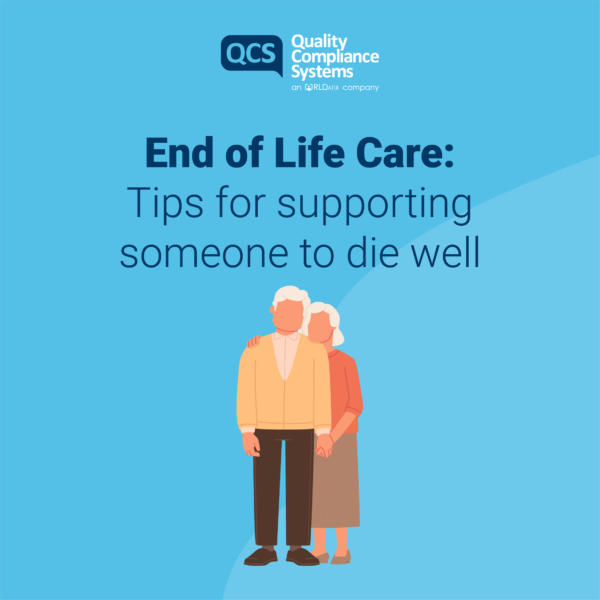Supporting someone to die well is, for some of us working in the industry, a part of the work to which we must become well accustomed. Death is an expected, and at times, anticipated part of life. It is a sensitive topic and one that is not always easy to cope with.
The experiences that people have with death are completely individual, and coping strategies will present differently for everyone. Someone who is aware that they are dying is likely to experience various emotions and sometimes worries about the process.
As potential providers of support, there are ways that we can offer both physical and emotional support to the individual, their loved ones and our own staff.
At QCS we have compiled some tips to support someone to die well and to also support the staff providing their care or support during this time.
Train Staff in End of Life Care
Providing staff with specific end of life care training will give them the knowledge and confidence to care for someone well at the end of their life. Check out your local hospice as sometimes they offer courses on the topic. An in-person training session in this area is far more valuable than e-learning (where this is possible).
Staff training goes beyond the classroom. Supporting staff by ensuring that they work alongside an experienced staff member in the area will build assurance and give them faith in their abilities.
Good training for staff in end of life care should cover:
- Having a gentle touch
- Being respectful
- Continuing to explain to the service user what is happening even if you do not receive a verbal response
- Sufficient pain relief
- The correct number of staff and equipment for what is required
- To ensure the service user’s comfort and making sure they appear in a comfortable position
- Regular turning to relieve areas of pressure
- Signs that a service user may no longer eat or drink
- Oral care
- Creating a soothing environment, soothing music, window ajar for example
- The importance of collaborating effectively with other professionals to ensure well organised and efficient care and support
Advance Care Planning
The importance of advance care planning, liaising, and coproducing with the service user and their family where desired to discuss these elements of care provision prior to the event are paramount.
Some aspects to be mindful of are:
The individual may be reluctant to discuss an advance care plan; they may be experiencing overwhelming feelings relating to the situation that they need time to process. These could include feelings of:
- Shock
- Worry
- Guilt
- Disbelief
- Anxiety
- Any financial burden they could leave behind
There are many thoughts and emotions that could be circling inside.
- If this is the case, respect their wishes – it does not have to be completed today
- If appropriate, you can gently explain that without the advance care plan they may not receive the support or care in their preferred way and perhaps if they feel they wish to, they could reschedule
More people are opting to use a Death Doula (someone who supports people at the end of their life), particularly those who wish to die in their own home. Consider if this is an option that you could highlight to the individual and their family that you are supporting.
Working in Partnership
Working as part of a multidisciplinary team is essential in providing high-quality, personcentred end of life care.
Above all, the most central factor to consider is good communication and especially listening. The ability to listen patiently, considerately and without judgement to the individual being supported is key. Someone’s wishes, needs, and wants may completely change during the dying process and this is ok. Having a caring, supportive, respectful team listening to them is crucial to a positive dying experience.
As a provider, by following these tips, you will save both time and effort, as guidance for staff will be clear and easy to follow.
Some Useful Resources:
- QCS launches Bereavement Support resource for social care workers, families and loved ones
https://www.qcs.co.uk/qcs-launches-bereavement-support-resource-for-social-careworkers-families-and-loved-ones/ - Skills for Care – Common Core Principles and competences for social care and health workers working with adults at the end of life
https://www.skillsforcare.org.uk/resources/documents/Developing-your-workforce/Care-topics/eELCA/Common-core-principles-and-competences-for-social-care-and-health-workers-working-with-adults-at-the-end-of-life.pdf - End of life care explained: what is it, how is it provided, and what are the challenges?
https://www.nuffieldtrust.org.uk/resource/end-of-life-care-explained-what-is-it-how-is-it-provided-and-what-are-the-challenges - NHS – Palliative and End of Life Resources
https://www.england.nhs.uk/eolc/resources/ - Best practice in palliative and end of life care for cancer
https://www.macmillan.org.uk/healthcare-professionals/cancer-pathways/palliative-and-end-of-life-care/best-practice





